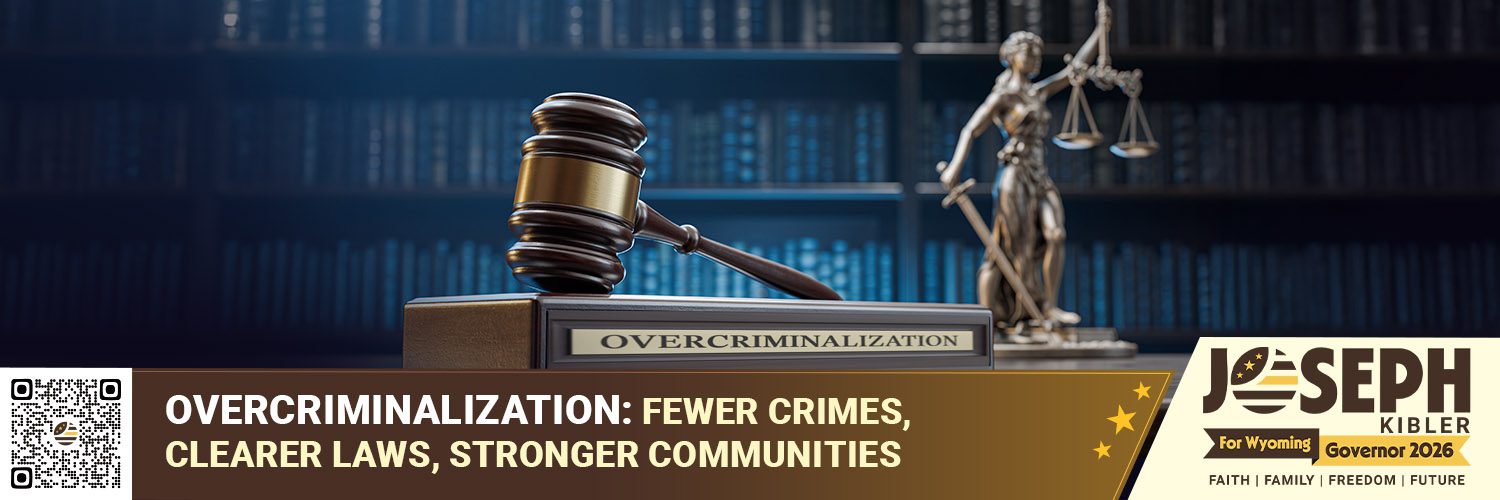Wyoming families deserve a justice system that is clear, fair, and focused on real harm—not a maze of overlapping rules that trip up good people and distract resources from public safety. Over time, criminal codes can grow barnacles. It’s time to scrape them off, tighten what matters, and align outcomes with common sense.
In the Wyoming governor 2026 race, my approach is simple: fewer crimes, clearer laws, stronger communities—and a government that stays lean while doing the basics well.
1) Clean up duplicative and vague statutes
Confusing, duplicative offenses waste time and create uneven outcomes. We’ll support a targeted statute cleanup—consolidating overlaps, clarifying definitions, and retiring provisions that don’t protect people. The aim is clarity over complexity so every citizen and officer knows the rules.
2) Focus enforcement on real harm
Justice works best when it aims at violence, fraud, theft, exploitation, and threats to public safety—the things that truly damage families and neighborhoods. Paperwork mistakes shouldn’t carry the same weight as predatory acts. Refocusing resources strengthens prevention and resolution where it counts.
3) Diversion that actually fixes problems
When accountability is paired with help that works, recidivism drops. Evidence-guided diversion—for first-time and low-level cases—can require restitution, treatment where appropriate, and verified completion. Keep it lean: clear criteria, measured outcomes, and quick decisions so victims see progress, not delays.
4) Veterans courts and rapid pathways back to stability
Service-connected issues can spiral if we ignore them. Veterans court options—paired with mentorship and quick access to services—honor those who served while protecting communities. The goal is swift accountability plus support, not a revolving door.
5) Record relief tied to restitution and results
After debts are paid and conditions are met, time-bound record relief helps people return to work and family life. Employers get clarity; families get stability; communities gain contributors. This is about earning back trust—not skipping accountability.
6) Make compliance simple and predictable
Confusion creates failure. Plain-English notices, consolidated court dates when possible, and text/email reminders reduce missed appearances and wasted trips. Do the right thing once, and you’re good—that’s the standard.
7) Measure what matters, publish what’s useful
Transparency builds confidence. Track victim restitution completion, time-to-disposition, and re-offense rates for diversion and specialty dockets. Share plain-language scorecards so families can see what’s working. Keep the metrics light and practical.
Why this helps Wyoming
- Families: fewer repeat offenses, faster restitution, clearer rules.
- Law enforcement & courts: time back for serious cases and community policing.
- Employers & communities: more people work-ready and fewer technical traps.
This is a solutions approach: lighter where government gets in the way, strong where it truly serves. It aligns with our four pillars—Faith (truth and mercy), Family (stability), Freedom (clear rules, fewer permissions), and the Future (paths that keep people contributing).
Give Freedom Back — because real freedom doesn’t need permission.
FAQs
Q1: Does simplifying the code mean being soft on crime?
No. It means aiming resources at real harm—violent and predatory acts—while removing duplicative traps that don’t make families safer.
Q2: Are you creating new programs or agencies?
No. This is about cleaning up the rulebook, using existing tools (diversion, veterans courts) more predictably, and publishing light, useful metrics.
Q3: How does record relief protect public safety?
It’s earned—after restitution and conditions are met. Stability and work reduce re-offense, which improves safety.
Q4: What keeps diversion accountable?
Clear eligibility, verified completion, restitution where applicable, and simple public metrics (time-to-completion, new offenses) to ensure it’s working.Q5: How will rural areas manage this with limited staff?
By using plain-English forms, consolidated dates, and simple reminders, we reduce no-shows and extra trips—saving time for both citizens and small offices.

